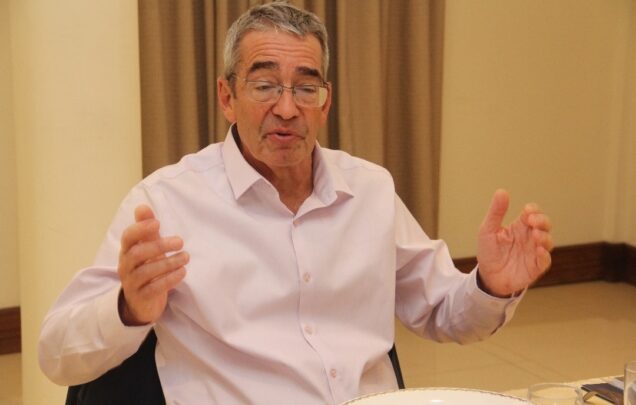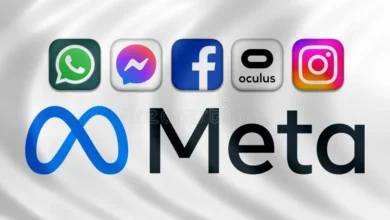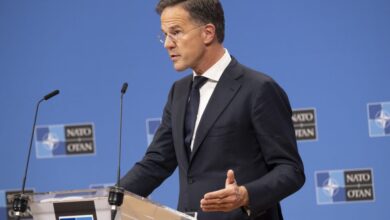
Israel disappointed Ghana abstained from IAEA voting on Iran’s non-compliance with nuclear obligations
Diplomats at the closed-door meeting said the board passed the resolution submitted by the United States, Britain, France and Germany with 19 countries in favour, 11 abstentions and three states - Russia, China and Burkina Faso - against.
The State of Israel has expressed disappointment in the government of Ghana for choosing to abstain from voting to support the declaration that Iran is in breach of its non-proliferation obligations.
The U.N. nuclear watchdog’s 35-nation Board of Governors, which Ghana chairs, made the declaration on Thursday, June 12, 2025, for the first time in almost 20 years, raising the prospect of reporting it to the U.N. Security Council.
“(The board) finds that Iran’s many failures to uphold its obligations since 2019 to provide the Agency with full and timely cooperation regarding undeclared nuclear material and activities at multiple undeclared locations in Iran … constitutes non-compliance with its obligations under its Safeguards Agreement with the Agency,” the International Atomic Energy Agency board resolution text seen by Reuters said.
The major step is the culmination of several festering stand-offs between the International Atomic Energy Agency and Iran that have arisen since President Donald Trump pulled the U.S. out of a nuclear deal between Tehran and major powers in 2018 during his first term, after which that deal unravelled. The resolution also comes at a time of particularly heightened tension, with the U.S. pulling staff out of the Middle East, and Trump warning the region could become dangerous and saying Washington would not let Iran have nuclear weapons.
Diplomats at the closed-door meeting said the board passed the resolution submitted by the United States, Britain, France and Germany with 19 countries in favour, 11 abstentions and three states – Russia, China and Burkina Faso – against.
The State of Israel’s response to Ghana’s abstinence
Speaking to news editors at an engagement at his residence in Ghana’s capital, Accra, the Ambassador of the State of Israel to Ghana, Sierra Leone and Liberia, Mr Roey Gilad, revealed that Ghana, an African powerhouse considered a trusted and longtime friend of Israel, abstained from the vote.
Ambassador Roey Gilad disclosed that there had been previous discussions with Ghana before the voting, and they had anticipated a clear stance by Ghana against Iran.
“Ghana abstained in the vote at the IAEA. Eventually, 19 States voted that Iran is in non-compliance with its nuclear programme. We’ve lobbied Ghana very strongly to support the resolution, yet Ghana abstained.
According to H.E. Ambassador, Iran’s nuclear activities pose a severe threat to countries like Israel and the world at large, and he expected Ghana to move away from its non-aligned movement position for once in the interest of Israel and world peace and stability.
Nonetheless, he admitted that, usually, on the board of the IAEA that casts the vote, the country that chairs usually abstains from voting by convention, as Ghana did.
“The formal reason is that Ghana is the chair of the board of the IAEA, but we felt this is something that is so crucial to Israel, which has to do with the future of Israel, that the State which is a member of the United Nations, Iran, is completely for the destruction of the Jewish sovereign state in Israel, a State which is considered to be by Ghana since 1957 as a good friend of Ghana. We thought this was one place where Ghana could express its support for Israel and vote for the non-compliance. It did not happen, and we’re disappointed,” Ambassador Gilad noted.
He emphasised that Israel fully respects Ghana’s choices in these international matters as a sovereign nation, but was quick to add that foreign policies are not static, and that Ghana may have to consider a rethink of its non-aligned positions in certain matters at the global stage.
“As much as we have full respect for the sovereign decision-making process in Ghana, including the Foreign Affairs [Ministry], we believe that the traditional policy of non-alliance that has here since 1957 under Nkrumah, I personally believe that may be the policy of non-alliance should be re-evaluated.
“We do it in Israel day in and day out. We check ourselves, we check our policy at every stage. I humbly say with full respect to the sovereign decision-making process in the Foreign Ministry here that I personally think that rethinking or re-evaluating non-alliance is something that will be healthy for the State.
Despite the disappointment, he noted that it will not have any negative impact on Ghana-Israeli bilateral relations, which is one of the best on the continent. He said the two nations will dialogue further on this matter and other issues of mutual interest.
“This is not going to cast a heavy shadow on our relations, but we cannot ignore it. If we discuss just among ourselves, it will bring no benefit. I think a mature relationship is the one between Israel and Ghana. We can discuss and iron out disagreements. If we don’t do that, then I will say that the relationship is not mature, since I consider Ghana to be mature and stable, and I think, as grown-up people, we can address it with the government. We did it in the past, and we will do it again,” he noted.
The International Atomic Energy Agency (IAEA) is a global organisation that promotes the safe, secure, and peaceful use of nuclear technology. It was established in 1957 as a UN specialised agency.
The IAEA works to prevent the spread of nuclear weapons and to ensure that nuclear energy is used for peaceful purposes, such as generating electricity, treating diseases, and improving agriculture.
DISCLAIMER: The Views, Comments, Opinions, Contributions and Statements made by Readers and Contributors on this platform do not necessarily represent the views or policy of FED Kastle Multimedia.




